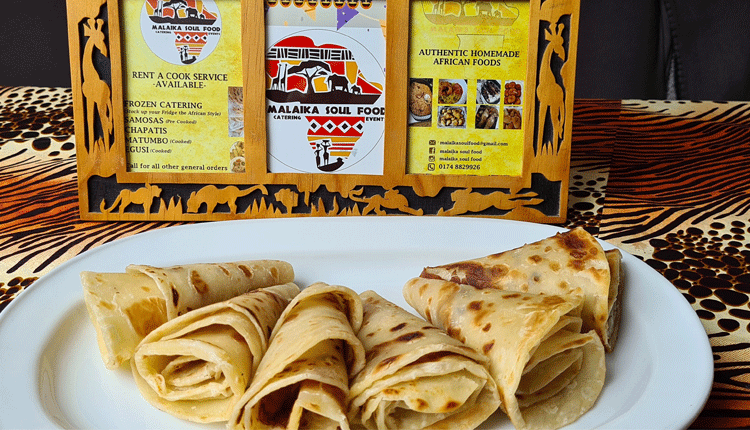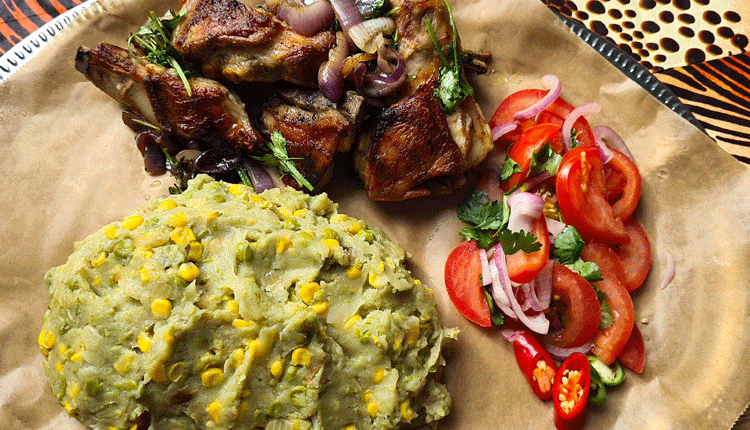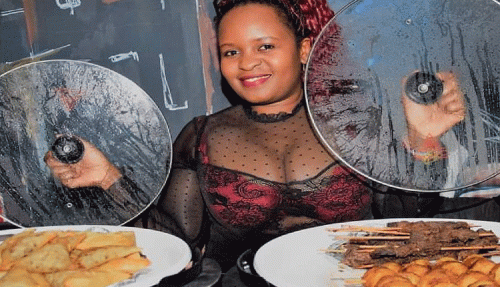Thursday, October 7th, 2021 00:00 | By

Phoebe Matesha displays some foods prepared at her restaurant in Cologne, Germany. Photo/PD/COURTESY
For Kenyans an d Africans in the Diaspora, delicacies from home hit differently.
It is not strange to see many travellers packed with all kinds of food stuff from their countries on their way to the Europe- from flour to dried meaty delicacies and spices, carefully wrapped for when they get homesick.
But these too run out at some point, and the only option is to find an eatery that serves these meals to catch a break, and travel back home via taste, and Malaika Soul Food is one such treasure trove in Cologne, Germany.
Founded by Phoebe Matesha Seiter, 39, Malaika Soul Food provides a range of African food from Nigeria, Ghana, Ethiopia, and Kenya among other African countries.
Aside from her Africans in the diaspora customers, Matesha’s mouth-watering recipes have earned her a lot of love from people of different descents all over social media.
The entrepreneur was born and raised in Kenya, attended Kenyatta University nursery and primary schools for her lower primary education, before joining St Andrew Primary School for her upper primary education.
She later joined St Francis Girls High School Mang’u until she completed her studies in 1999 to join the University of Nairobi to pursue a Diploma in Cultural Tourism.

Upon graduation in 2005, Phoebe travelled to Germany on the Au Pair Programme.
After her studies, she worked in different companies, the longest being a production firm.
After five years and with great passion for cooking, she made the decision to start her own catering business.
“Malaika Soul Food was always what I wanted to do deep down within me and on a subconscious level, only that I needed the courage to monetise it.
There was always a need for African food and I was always being asked to cook in different occasions so I drew my first business plan in 2005,” she says.
She did not have the capital she needed, but with the plan, she started out with the little she had. She invested her money to buy equipment, which became a life investment.
“I needed to get equipment which would help me work smart and not hard: big sufurias, machines that knead flour and cut vegetables, portable gas cookers to events, cooler boxes, special sealing machines.
The reception when I started was positive, only that sometimes, you have to go the extra mile to make your business different by being professional, investing in marketing, and delivering what you promised: authentic African food.
My first customers were naturally Africans in general, but with time it has been Germans fascinated to try out the African Kitchen,” she shares.
Aside from cooking for big events around and out of her location, she also has an online shop of the same name, where she sells meals all over Germany through DHL.
For catering, she offers African foods, but mainly East African options. And although she has learned to cook many other meals from different cultural backgrounds, her customers get customised menu.
When the need arises she has chefs from other countries such as Ghana or Nigeria to cook for her clients.
Her greatest drive, which is also her favourite thing about the business, is when she meets people who appreciate what she does.

“Another thing I love is the fact that no menu is the same, mixing and matching different foods, attending different events, meeting different people and just basically doing what I love to do best,” she shares.
Research in investment
Like any other entrepreneurs, Phoebe has had her equal share of challenges, but she has lived to learn and find hacks on how to run her business.
Her Diploma in Cultural Tourism course comes in handy to answer questions from people who want to know more about Kenya and Africa in general, and also having normal conversation with those who have visited in Kenya.
“It is not easy operantig in a foreign country, but it is doable, a never ending story of paperwork, rules, requirements, meaning you will need to borrow patience from God and the whole village.
Inability to speak the German language is also a barrier, but I learned and mastered it and took a few related courses on how to run a business to communicate and express myself effectively.
Some important lessons I learnt: if you don’t know, always ask even though it will make you look stupid- just ask.
Better safe than sorry. Another important lesson is that Rome was not built in a day.
I have not reached where I would say I’ve made it 100 per cent, but I see the far I have come, which is also a positive driving force to reach my goal,” she intimates.
The key to running a successful online food business, she says, is by not compromising on the quality. What you see on social media is exactly what you will get on your plate.
And this is why she uses only pictures of her own food while offering a balance between quality and quantity.
And to other entrepreneurs who are interested in investing in the same, she advises them to take time and do research before diving in.
“Please, please, practise professionalism in whatever you want to do. Learn the language well for you to communicate.
Lastly, a special message to some sisters and brothers from Kenya; please stop comparing the prices of services offered here in Germany to those back home. Stop comparing the euro to the shilling. It’s incomparable,” advises Phoebe.








